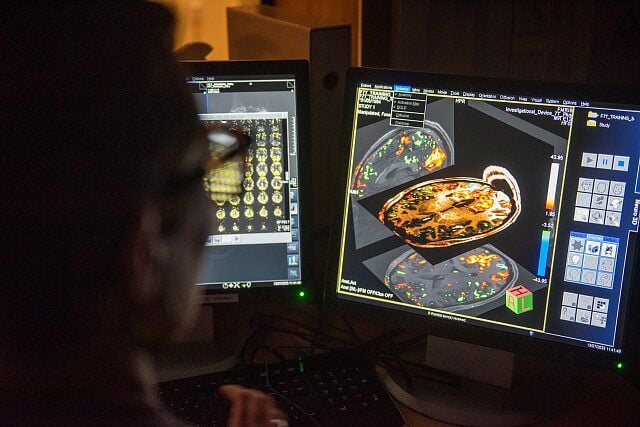Professor Sir Nigel Shadbolt appointed Chair of AI@Oxford Research
Posted: 12th November 2025
The University of Oxford has announced that Department of Computer Science Professor Sir Nigel Shadbolt, Principal of Jesus College and Professorial Research Fellow in Computer Science, has been appointed Chair of AI@Oxford Research, a new role to champion and coordinate Oxford’s world-class research in artificial intelligence (AI).
This appointment will highlight Oxford’s intent to cement its position as a global leader in AI research and innovation, uniting expertise from across its four academic divisions and the Gardens, Libraries and Museums (GLAM). The initiative, jointly funded by the divisions and supported by the John Fell Fund, will enhance coordination, visibility and impact of AI research across the University, while fostering new collaborations and investment opportunities.
The new AI@Oxford Research initiative will:
- Map and coordinate the full spectrum of AI research across divisions;
- Showcase and promote Oxford’s expertise to external partners, and policymakers;
- Develop large-scale research proposals to attract transformational investment; and
- Support a shared online presence that highlights Oxford’s AI community, people and impact.

Oxford has extraordinary depth and breadth in AI research - spanning the sciences, social sciences, humanities, medicine, our libraries and museums. AI@Oxford Research will help connect and amplify these efforts, ensuring that Oxford continues to lead in both the creation and responsible application of AI for the benefit of humanity. I’m delighted to take on this role and to work with colleagues across the University to shape and communicate our collective vision. Professor Sir Nigel Shadbolt, Professorial Research Fellow in Computer Science
Professor Shadbolt, one of the UK’s foremost AI experts, co-founded the Open Data Institute with Sir Tim Berners-Lee and has long been a leading advocate for trustworthy, transparent technology. In his new role, he will oversee the creation of a new website showcasing Oxford’s AI research, act as a focal point for major external partnerships, and help to develop transformational bids to enable future investment in people, infrastructure and innovation.
‘Sometimes it feels like Oxford University’s best kept secret is that we are the leading academic institution in the world, across the entire breadth of AI from its foundations, to its application, its economics, its ethics and on through safety,’ said Professor Jim Naismith, Head of the Mathematical, Physical and Life Sciences (MPLS) Division. ‘Nigel is a visionary leader who combines deep expertise with a clear understanding of how to connect people and ideas. He is going to ensure our profile matches our accomplishments, help us pull together across the collegiate university, and act as an ambassador for AI at Oxford.’
The appointment builds on the University’s growing momentum in AI implementation and education, led by Professor Anne Trefethen, Pro-Vice-Chancellor (Digital). Professor Trefethen has championed making AI tools and training accessible to all Oxford staff and students with support from the University’s AI Competency Centre and in-house specialists across the University, and through strategic partnerships with leading AI companies.
We want everyone at Oxford - from researchers to professional staff - to have the skills and confidence to use AI tools effectively. By coupling implementation with research leadership, Oxford is creating a truly joined-up approach that supports innovation and ensures we are leading this transformation responsibly and inclusively. Professor Anne Trefethen, Pro-Vice-Chancellor (Digital), Department of Engineering Science
AI research across boundaries
AI is already driving a new wave of interdisciplinary discovery at Oxford. From molecular design to medical imaging and mathematical modelling, researchers across divisions are harnessing AI to accelerate scientific progress and improve human health.
For example, in the Department of Computer Science, Professor Ana Namburete is leading WOMB2COT, a project recently awarded a European Research Council Starting Grant. Her research team is using AI, computational neuroanatomy and biophysics-inspired methods to significantly enhance ultrasound brain imaging for new-borns. By transforming low-cost ultrasound scans into high-resolution 3D images, her work bridges the gap between prenatal and neonatal care, making advanced brain monitoring more accessible in clinical settings.
In another major initiative, Professor Charlotte Deane (Department of Statistics, MPLS) and Professor Frank von Delft (Nuffield Department of Medicine, MSD) are leading OpenBind: a project that uses AI to accelerate the discovery of new drugs and chemical probes, by prioritising the design of small molecules that expand chemical diversity and identifying novel ways to bind to proteins.
Similarly, Professor Mark Coles (Kennedy Institute of Rheumatology) and Professor Eamonn Gaffney (Mathematical Institute), along with Professor Simon Leedham (Nuffield Department of Medicine) and Professor Helen Byrne (Mathematical Institute), are pioneering AI-driven computational methods to explore cellular neighbourhoods in cancer. Their collaborative work combines imaging, mathematics, and data science to reveal how cells interact within tumours - insights that could transform cancer diagnostics and treatment.
Meanwhile, Oxford’s Social Sciences and Humanities divisions are harnessing AI to address global challenges in education, governance and justice.
The Oxford AI in Education Hub – a strategic initiative in the Social Sciences Division – brings together researchers, teachers and policymakers to explore how AI can enhance learning and teaching worldwide. With international partnerships spanning the UK, Europe, and the Global South, this hub is investigating both the potential and the ethics of using AI in classrooms and education systems at scale.
At the Blavatnik School of Government, the newly launched AI for Justice collaboration with the Clooney Foundation for Justice is applying AI technologies to help document and analyse evidence of human rights abuses, with the goal of improving access to justice for victims around the world.

The University has also established the AI Governance Initiative at the Oxford Martin School: a research centre dedicated to understanding how AI can be governed safely, ethically, and effectively. While the Institute for Ethics in AI brings together world-leading philosophers with other experts in the humanities, policy and industry to confront the ethical questions around AI's implementation. Bringing together expertise from philosophy, law, public policy, and computer science, this initiative is informing global debates on how to design governance frameworks that maximise benefits while reducing risks.
AI will transform aspects of modern life, from healthcare to education and culture, bringing both challenges and opportunities. Oxford’s breadth across disciplines gives us the opportunity - and the responsibility - to be a leader in exploring and balancing the innovation, ethical and other impacts of AI. Nigel’s appointment will help us harness that potential and demonstrate Oxford’s leadership in this fast-moving field. Professor Patrick Grant, Pro-Vice-Chancellor for Research
As these projects illustrate, AI research at Oxford encompasses the full spectrum of academic disciplines - from the lab bench to the policy arena - and reflects Oxford’s unique ability to unite technical innovation with ethical, societal and cultural insight.
AI@Oxford Research reflects the University’s strategic commitment to shaping the future of AI - ensuring Oxford’s research, teaching and public engagement continue to inform and lead the global conversation on how it can be used responsibly and for societal good.
Learn more about AI research at Oxford here.
